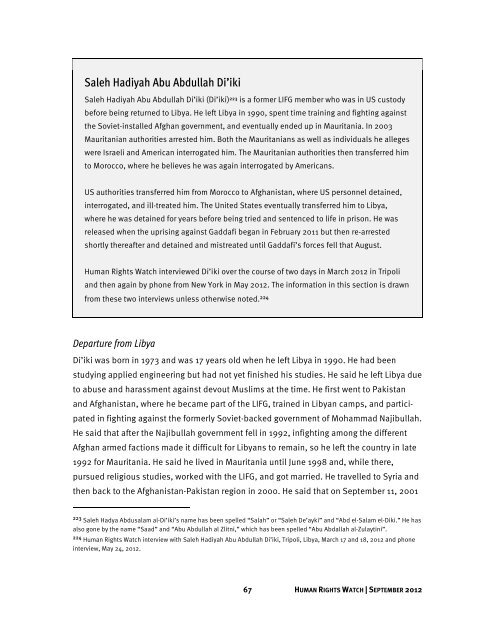Delivered Into Enemy Hands - Human Rights Watch
Delivered Into Enemy Hands - Human Rights Watch
Delivered Into Enemy Hands - Human Rights Watch
Create successful ePaper yourself
Turn your PDF publications into a flip-book with our unique Google optimized e-Paper software.
Saleh Hadiyah Abu Abdullah Di’iki<br />
Saleh Hadiyah Abu Abdullah Di’iki (Di’iki) 223 is a former LIFG member who was in US custody<br />
before being returned to Libya. He left Libya in 1990, spent time training and fighting against<br />
the Soviet-installed Afghan government, and eventually ended up in Mauritania. In 2003<br />
Mauritanian authorities arrested him. Both the Mauritanians as well as individuals he alleges<br />
were Israeli and American interrogated him. The Mauritanian authorities then transferred him<br />
to Morocco, where he believes he was again interrogated by Americans.<br />
US authorities transferred him from Morocco to Afghanistan, where US personnel detained,<br />
interrogated, and ill-treated him. The United States eventually transferred him to Libya,<br />
where he was detained for years before being tried and sentenced to life in prison. He was<br />
released when the uprising against Gaddafi began in February 2011 but then re-arrested<br />
shortly thereafter and detained and mistreated until Gaddafi’s forces fell that August.<br />
<strong>Human</strong> <strong>Rights</strong> <strong>Watch</strong> interviewed Di’iki over the course of two days in March 2012 in Tripoli<br />
and then again by phone from New York in May 2012. The information in this section is drawn<br />
from these two interviews unless otherwise noted. 224<br />
Departure from Libya<br />
Di’iki was born in 1973 and was 17 years old when he left Libya in 1990. He had been<br />
studying applied engineering but had not yet finished his studies. He said he left Libya due<br />
to abuse and harassment against devout Muslims at the time. He first went to Pakistan<br />
and Afghanistan, where he became part of the LIFG, trained in Libyan camps, and partici-<br />
pated in fighting against the formerly Soviet-backed government of Mohammad Najibullah.<br />
He said that after the Najibullah government fell in 1992, infighting among the different<br />
Afghan armed factions made it difficult for Libyans to remain, so he left the country in late<br />
1992 for Mauritania. He said he lived in Mauritania until June 1998 and, while there,<br />
pursued religious studies, worked with the LIFG, and got married. He travelled to Syria and<br />
then back to the Afghanistan-Pakistan region in 2000. He said that on September 11, 2001<br />
223 Saleh Hadya Abdusalam al-Di’iki’s name has been spelled “Salah” or “Saleh De’ayki” and “Abd el-Salam el-Diki.” He has<br />
also gone by the name “Saad” and “Abu Abdullah al Zlitni,” which has been spelled “Abu Abdallah al-Zulaytini”.<br />
224 <strong>Human</strong> <strong>Rights</strong> <strong>Watch</strong> interview with Saleh Hadiyah Abu Abdullah Di’iki, Tripoli, Libya, March 17 and 18, 2012 and phone<br />
interview, May 24, 2012.<br />
67 HUMAN RIGHTS WATCH | SEPTEMBER 2012
















